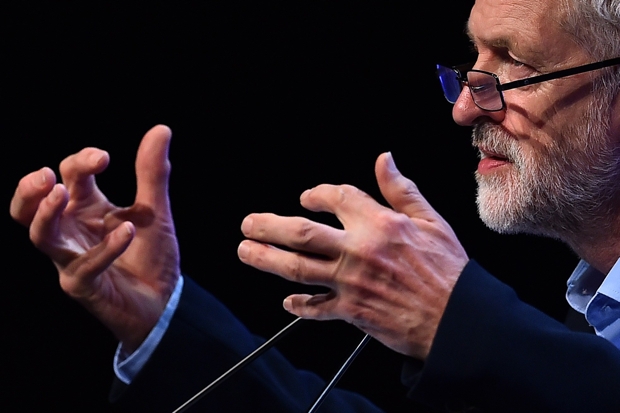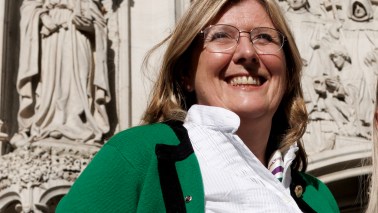One major defect of Jeremy Corbyn has not yet been discussed. He’s not a religious believer. Why is this a defect? Because these days left-wing idealism is hugely boosted by an alliance with religion. Only so can it widen its appeal beyond a chippy clique.
Maybe he’s half-aware of this. In a recent interview with the Christian magazine Third Way, he said that his upbringing was quite religious, and that he retains some sympathy with faith: ‘I’m not anti-religious at all. Not at all… I find religion very interesting. I find the power of faith very interesting. I have friends who are very strongly atheist and wouldn’t have anything to do with any faith; but I take a much more relaxed view of it. I think the faith community offers and does a great deal for people.’ I predict he’ll go a bit further soon, and start talking about the Christian basis of his socialism, citing Jesus as an early role model. If so, he might just be able to build support beyond his obvious base. Enough to keep him in the job for a while.
New Labour’s focus was partly on the overlap of progressive idealism and religion. Blair won the trust of the middle class by presenting himself as an idealistic vicar who was a bit too cool for the Church. Of course this approach earned him plenty of derision as a sanctimonious git with a messiah-complex, but that was a small price to pay for his electoral success. When Brown took over, he was canny enough to grasp the importance of this religious aspect of contemporary progressive politics. He successfully re-branded himself as the ‘son of the manse’, the quietly moral offshoot of Presbyterian idealism. It was successful for a while. And over the water, Obama won the presidency by confusing the roles of politician and preacher as no one had done for many decades, or perhaps ever, because the civil rights movement had created a new overlap that he was the first to exploit fully.
Ed Miliband was too atheist. He tried to soften this with his Judaism, but it didn’t quite work. ‘I have a particular faith,’ he once said. ‘I describe myself as a Jewish atheist. I’m Jewish by birth origin and it’s a part of who I am.’ His hope was that his Judaism would give him a vaguely religious aura, that it might reassure believers that he understood the importance of religion, despite his atheism. But secular Judaism doesn’t work like that. To the average gentile, it looks like a particularly stark rejection of religion. For aren’t secular Jews (Marx, Freud, Woody Allen) the most energetic atheists of all? Talk of ‘faith’, when divorced from mainstream organised religion, is not very reassuring. Didn’t Lenin and Hitler have bucketloads of faith?
The British electorate wants a party leader to be sympathetic to religion. A Tory can easily enough signal mild Anglican allegiance, as David Cameron does so well. Corbyn has a trickier job, for two reasons. Lots of people in his party hate religion. And his religious-stance matters more, for he is more clearly in the business of selling a vision, in persuading the electorate that something new is possible. And the very concepts of hope and change have Christian roots – imagine the British left without its broad imagery of the New Jerusalem. This is something that various left-wing intellectuals have been admitting over the last decade. Terry Eagleton has powerfully argued that progressive humanism has Judeo-Christian roots. More recently the veteran lefty academic David Marquand, though nonreligious himself, has suggested that a close alliance with religion might be the way forward for a new socialism. Even Russell Brand signals the shift: his new-agey, John Lennon-ish, expanded-consciousness version of political radicalism reflects a hunger for a more comprehensive idealism, of which a restructured tax system is just an aspect.
So can Corbyn build an alliance between the left and religion? It’s hard for a non-believer to do this: saying that faith communities do a lot of good isn’t really enough. So it’s hard to see how he’ll survive, in this new climate, in which secular political idealism is not enough.







Comments